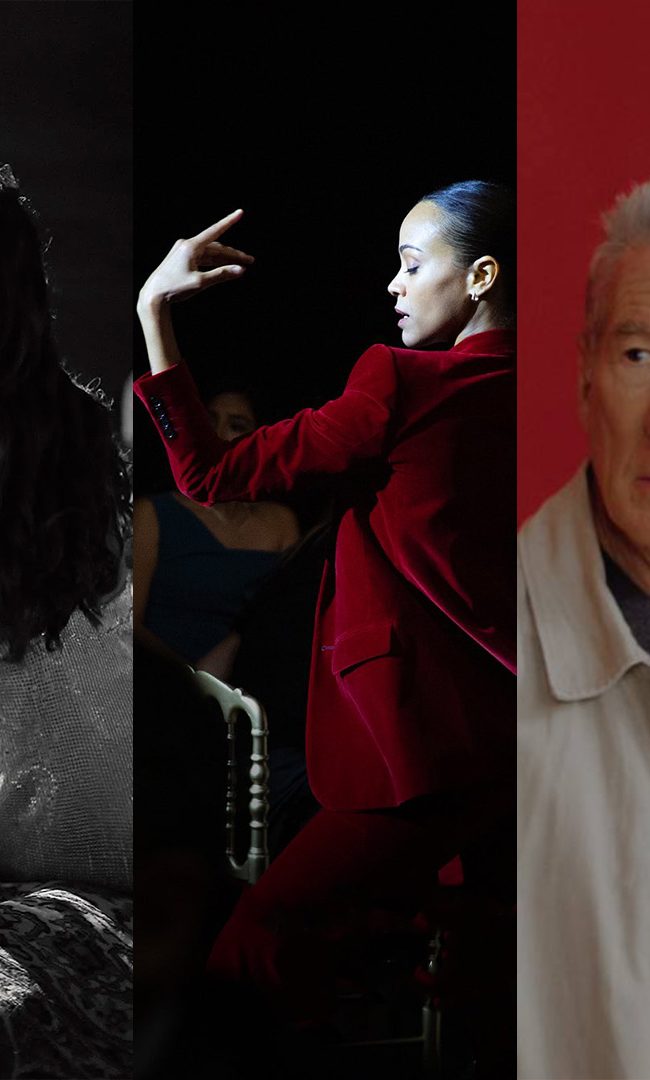Introduction
Greetings HtN readers, this is Don Lewis, Editor of the site and I wanted to welcome you to the 2015 Hammer to Nail Awards. Next month marks my official one-year anniversary of Editor of the site and it’s been a great year with a TON of great, true indie films. You should have seen the list we had to cull these from! Brutal. But in that long list of outstanding indies from the year just passed, there’s a clear beacon shining on the fact that quality films are being made for under $1 million. Often for way, way under that. So while there was much frustration and deep sighs of “I know…I know” after reading Mike S. Ryan’s “State of the Indie Film Union Address” yesterday, it’s a nice one-two punch to have so many great films get recognized today. Is there a “glut” of small, indie films that are struggling to find an audience? Yup. But that’s what we’re here for, to help shine a light on little films that shouldn’t fall between the cracks. With all that being said, here’s Michael Tully to swing the arm for our 2015 Hammer to Nail Awards…
The Rules
To clarify, here are our general voting parameters and rules for eligibility:
1) American narrative features produced for one million dollars or less.
2) The film was first released officially—theatrical, VOD, DVD, online (for these purposes, a festival premiere doesn’t qualify)—in said calendar year.
3) No HTN contributor is allowed to vote for a film in which they have a cast/crew credit (i.e., John Magary did not vote for The Mend, Alex Ross Perry did not vote for Queen of Earth, Susanna Locascio did not vote for She’s Lost Control, etc.).
4) Each contributor ranks up to 13 films in order from 1 (highest) to 13 (lowest). The number 1 film receives 13 points; 2 receives 12 points; and on down the line. These results are then added up in order to calculate our winners.
5) In the case of a tie with regard to points, these are listed alphabetically.
[A gentle, polite reminder: This type of thing will never be a perfect science. For example, not everyone got to see every eligible film. Beyond that, there are always going to be some titles that simply slipped through the cracks. But even factoring those unfortunate realities into the equation, we nonetheless stand behind our commitment to concentrating our year-end awards attention on films that have been produced in this just-as-worthy-yet-so-often-unfairly-overlooked narrative budgetary realm. A humble suggestion: Don’t look at this post in order to criticize what’s not here; use it to recognize and discover what is here.]
************************************************************************************************************************************************************************
GOLDEN HAMMER
 Thanks to ever-advancing technology, “professional quality” movies are supposedly easier to make than ever. Which is true… to an extent. While these new cameras are impressive, when it comes to content —that is to say visionary cinema of the most adventurous and ambitious formal order — why does it feel like an impossible miracle anytime something truly audacious makes it onto the screen? I’m talking about the types of productions with budgets that exceed personal credit card limits. I’m talking about those outside-the-system projects that need the grace of wealthier-than-we individuals to write big checks (as in, the upper-five- to six-figure realm).
Thanks to ever-advancing technology, “professional quality” movies are supposedly easier to make than ever. Which is true… to an extent. While these new cameras are impressive, when it comes to content —that is to say visionary cinema of the most adventurous and ambitious formal order — why does it feel like an impossible miracle anytime something truly audacious makes it onto the screen? I’m talking about the types of productions with budgets that exceed personal credit card limits. I’m talking about those outside-the-system projects that need the grace of wealthier-than-we individuals to write big checks (as in, the upper-five- to six-figure realm).
Let’s be clear. Financing a feature film is an ultra-high-risk investment. As a filmmaker, to ignore that blunt truth is to be ungrateful at best and irresponsible at worst. But at the same time, the fact remains that the most electrifying, exciting, and game-changing movies are only borne when dangerous risks have been taken. When it comes to surpassingly ambitious cinema — i.e., the types of movies that we champion on this very website — the concept of “playing it safe” can prove to be more a more reckless approach than plunging out further, into a murky, unproven abyss — which, as we all know, is where the mind-blowing magic happens.
While crowdfunding has proven to be a very worthy way to finance smaller independent productions, if you’re not a well-known celebrity director, it’s idiotic to set a bar of success at 100k-or-more on a site like Kickstarter or Indiegogo. The sad reality is that even with all this awesome technology, and even with the help and support of so many friends and eager collaborators, making ambitious motion pictures still costs real money. Technology hasn’t fixed that problem yet.
For that reason, rather than bestowing the 2015 Golden Hammer upon one individual in particular, we’ve decided to take a more cosmic approach. This year’s recipients are too many to name, and, in the noblest of cases, they actively choose to remain nameless. They are individuals with great taste in cinema, who understand that they are in a privileged position and that we filmmakers desperately need them, for without them our movies would never exist. To anyone who has, or plans to, invest in a risky feature film production — no “name” cast, an idiosyncratic vision, not merely another watered-down studio system calling card that “might hit the Sundance jackpot”— this year’s Golden Hammer goes to all of you. (Michael Tully)
 ************************************************************************************************************************************************************************
************************************************************************************************************************************************************************
SILVER NAIL
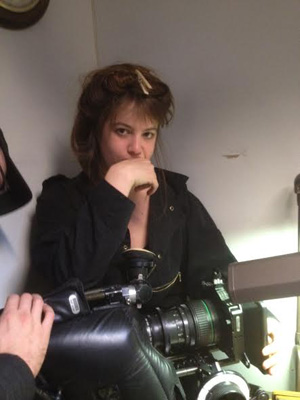 It’s fairly easy to recognize the work of cinematographer Ashley Connor: if you’ve viewed a low-budget indie in the last two years and at some juncture had the fleeting, electric thought “this looks like nothing else,” then there’s a solid chance that Connor was behind the camera. Her collaborations with director Josephine Decker (Thou Wast Mild and Lovely and Butter On The Latch) are brimming with intuition, inventiveness, curiosity, and energy. From nothing but meager means and a DSLR, she managed to wrangle some of the most lively and enigmatic images of 2014.
It’s fairly easy to recognize the work of cinematographer Ashley Connor: if you’ve viewed a low-budget indie in the last two years and at some juncture had the fleeting, electric thought “this looks like nothing else,” then there’s a solid chance that Connor was behind the camera. Her collaborations with director Josephine Decker (Thou Wast Mild and Lovely and Butter On The Latch) are brimming with intuition, inventiveness, curiosity, and energy. From nothing but meager means and a DSLR, she managed to wrangle some of the most lively and enigmatic images of 2014.
In 2015, Connor was ubiquitous on the festival circuit, and the films that she shot offered a glimpse into just how insanely wide her range of talents is. Carleton Ranney’s throwback hacking thriller Jackrabbit debuted at Tribeca, and Zia Anger’s multi-format death-of-film fable My Last Film—featuring two segments with completely different shooting styles, each one gorgeous in completely different ways—played at NYFF. Alison Bagnall’s lo-fi comic drama Funny Bunny (SXSW) and Jorge Torres-Torres’ Sisters of the Plague (which premiered at OutFest) rounded out the year. I can recall striking images from each of these films on a whim, though my favorite of her work in 2015 might be in the Zia Anger-directed video for Norwegian musician Jenny Hval’s “That Battle is Over,” where Connor’s lens serves as a voyeuristic tour guide venturing into a softly-lit feminine, utilitarian house of horrors. Recently completed projects include Dustin Guy Defa’s celluloid shot feature Human People, which is maybe the most exciting and perfectly suited pairing of indie talents in recent memory.
“One of my favorite things about working with Ashley is how actively she engages in the craft of narrative. She is constantly thinking through blocking and lighting and context to tell the story in the strongest way. When Ashley and I collaborate, we create a new language together: an unspoken craft that emerges from sea-depths, spirals through the witch-hunts and lands somewhere between two thighs. She intuits. She breathes. She is.” — Josephine Decker
“Ashley’s approach to the role of “cinematographer” is radical. Her cinematographic style departs from tradition in incredibly inventive and often subtle ways. She is exactly the type of person we need if we want to dig filmmaking out of the dark ages and allow it to be something other than rich, white, and male.” — Zia Anger
Congratulations to Ashley Connor, the much deserving recipient of this year’s Silver Nail!
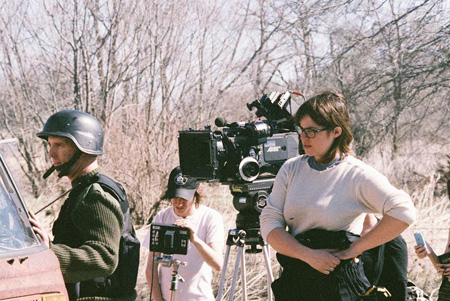 ************************************************************************************************************************************************************************
************************************************************************************************************************************************************************
THE TOP 15 FILMS OF 2015
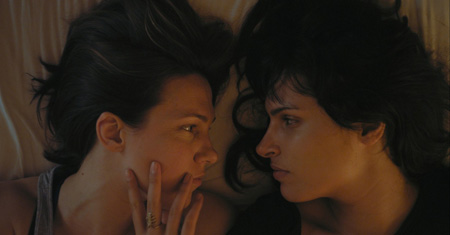 14. Appropriate Behaviour (Desiree Akhavan, 26 points)
14. Appropriate Behaviour (Desiree Akhavan, 26 points)
In her debut feature, writer-director Desiree Akhavan pulls off a neat trick. She mines the hyper-specific identity of her protagonist Shireen—a 20-something, Iranian-American, bisexual woman living in Brooklyn—for comedy while delivering a universal story of self-discovery. As the film cuts back and forth between the blossom and demise of Shireen’s first relationship with a woman, she learns lessons of humility and self-respect familiar to anyone who has stumbled their way through young adulthood. In a scene characteristic of Akhavan’s effortless blend of dry humor and emotional sincerity, Shireen tells a lingerie saleswoman: “I’m looking for the grown-up underwear of a woman in charge of her sexuality and not afraid of change.” Aren’t we all? (Nicholas Kemp)
************************************************************************************************************************************************************************
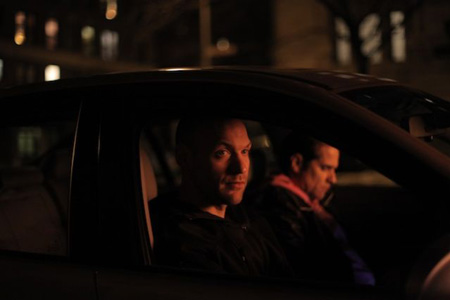 13. Glass Chin (Noah Buschel, 34 points)
13. Glass Chin (Noah Buschel, 34 points)
Noah Buschel’s Glass Chin (streaming now on Netflix) is a boxing picture without a single fight, a thriller with a murder that takes place off-screen, a slow burn modern neo-noir with dialogue as memorable as Mamet’s that wears the cadences and uninflected, symmetrical compositions of an Ozu picture effortlessly, mixing these influences in a way that seems all its own. In its tale of small time crime and working class desperation, Bud “The Saint” Gordon (Corey Stoll), a once-hallowed prospect who was felled in a surprise one-punch knockout during his shot at stardom, is in hawk to a shady, smooth talking restaurateur named J.J. (a chillingly effective Billy Crudup), a Pittsburgh ex-pat with dandy stylings and a quick wit that can’t conceal the fact that he’s clearly some kind of sociopath. A back-to-the-basics throwback that nonetheless contains more than its fair share of bravura directorial choices and performative turns, Glass Chin feels more fully realized conceptually than the broad majority of low-budget American indies. (Brandon Harris)
************************************************************************************************************************************************************************
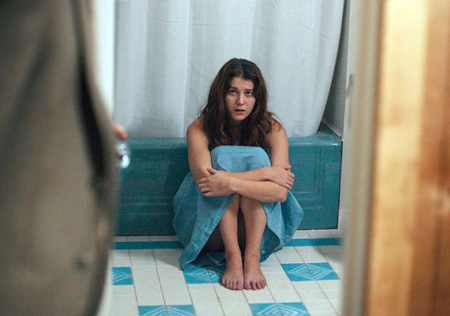 12. Faults (Riley Stearns, 37 points)
12. Faults (Riley Stearns, 37 points)
Independent filmmakers seem very susceptible to accidentally falling under the spell of some strangely specific trends, and it would be more than fair to say that cults and imprisoned, brainwashed young women are the new “young Southern boys accidentally killing each other.” While the fact that Faults (streaming now on Netflix) is a complete subversion of this conceit isn’t necessarily intentional, no one is going to confuse this film with its horde of film festival brethren. Faults is purely its own brand of idiosyncratic strangeness, which is even more impressive considering it’s director Riley Stearn’s first feature. The acerbic precision with which all the exhausted, dead-eyed supporting characters speak and the woozy, confining effect of the camera’s slow zooms all aim to highlight the central enigma that fuels the film: Mary Elizabeth Winstead’s confined cult-member Claire. Winstead has long been one of indie film’s most dependable chameleons, and Faults gets a lot of mileage out of letting her run the show. She vacillates between half-smart victim and diabolical puppetmaster so quickly and naturally that the audience is as much in the palm of her hand as the drearily confused characters trying to control her. It’s an enrapturing performance and one of the year’s best. (Mark Lukenbill)
************************************************************************************************************************************************************************
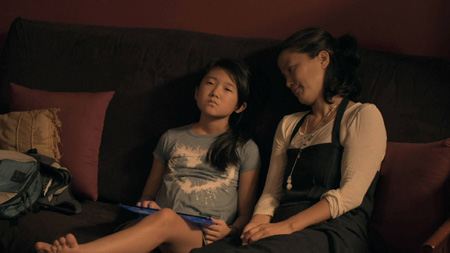 11. Advantageous (Jennifer Phang, 40 points)
11. Advantageous (Jennifer Phang, 40 points)
Is there love without existence? Advantageous is a mother-daughter love story, and a brilliant existential inquiry about technology warping the notion of selfhood. As a future city grows bigger and richer around Gwen (co-writer Jacqueline Kim) and her young daughter, Jules (Samantha Kim, no relation), Gwen ages out of her position as a spokesperson for a company creating creepy human hardware. With no income and no future without a younger face, Gwen fears that Jules will be denied access to the precarious social stepladder. In director Jennifer Phang’s imagined world, just a hair away from our own, there is a powerful, largely unseen and decaying upper class, and this, paired with the extreme and random acts of violence (bombings elegantly portrayed in CGI) point to an uncertain future for all and augment the sense of Gwen’s alienation and doom. The film’s effects and design are rich and detailed, making it stand up to much higher-budgeted science fiction films. But the power of Advantageous lies in its truthful emotional core—the philosophical musings of young Jules, the source of all hope, yet grappling with her own feelings of self-worth and belonging; the intense chemistry between mother and daughter, and Gwen’s realization of the sacrifice she’ll make for love. (Holly Herrick)
************************************************************************************************************************************************************************
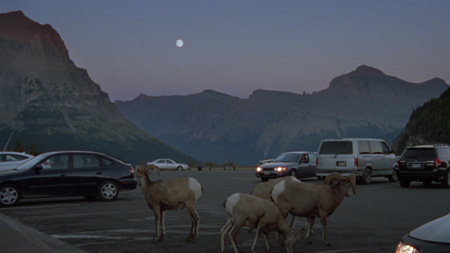 10 (TIE). Tired Moonlight (Britni West, 47 points)
10 (TIE). Tired Moonlight (Britni West, 47 points)
In her feature debut, Britni West searches and digs through the small-town Montana where she was raised in order to uncover its very essence. She weaves her characters together with loving attention, aided visually by the striking 16mm cinematography of Adam Ginsberg and aurally by the running poetry of Paul Dickinson. Through her dedication to the material, West creates a living snapshot of a community that, despite the fact that the characters and situations are evidently fictitious, feels as real as any other. (Dustin Guy Defa)
************************************************************************************************************************************************************************
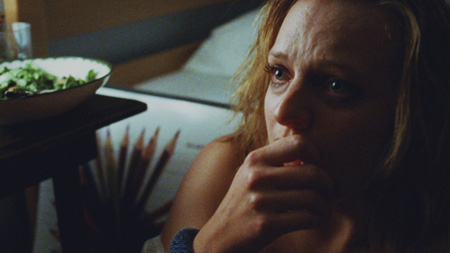 10 (TIE). Queen of Earth (Alex Ross Perry, 47 points)
10 (TIE). Queen of Earth (Alex Ross Perry, 47 points)
Alex Ross Perry took his Manhattanite sensibility out into the country for this one, and the film’s isolated location creates space for egos to expand and unstructured time for resentments to be wrung from the relationship between old friends. Perry’s gifted, entitled monsters aren’t easy to empathize with, but they hold a magnifying glass to a kind of effete brutality that’s painfully relatable. In Queen of the Earth (streaming now on Netflix) Elisabeth Moss plays Catherine as a grotesque embodiment of animalistic will: badly bruised, she wastes her fine mind and sensitivity on verbal daggers and manipulation. Katherine Waterston more than holds her own in a less showy role as Virginia, trying hard to connect with her foil and doing her best to protect herself in the process. Perry directs with a decade-under-the-influence-flavored, low-key swagger, now cramming the frame full of Moss’s raging face, now sitting back and slowly panning and zooming in voyeuristic POVs, dusting off many an old-timey dissolve. He’s arguably the most exciting American filmmaker working today, and here he gives Moss an opportunity to redefine herself in an iconic, larger-than life performance. (Paul Sbrizzi)
************************************************************************************************************************************************************************
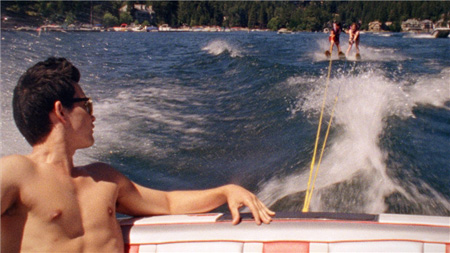 9. L For Leisure (Lev Kalman and Whitney Horn, 48 points)
9. L For Leisure (Lev Kalman and Whitney Horn, 48 points)
Lev Kalman and Whitney Horn’s follow up to their equally great Blondes in the Jungle is a formally ambitious experimental comedy about the simple pleasures of lounging around. Gorgeously shot on 16mm, L for Leisure comingles avant-garde absurdity with indie malaise to create a striking, singular film that defies any attempt at categorization. The dialog is endlessly quotable (“Who wants to fuck around with some jeans?”) and the electronic score is superb. If there was justice in the world, Kalman and Horn would get a multi-million dollar, three-picture deal to keep making movies exactly like this one. In the future, when you look up “ennui” in the dictionary, it will just say, “see L for Leisure.” (Zach Clark)
************************************************************************************************************************************************************************
 8. Results (Andrew Bujalski, 61 points)
8. Results (Andrew Bujalski, 61 points)
A promotional still for Andrew Bujalski’s Results (streaming now on Netflix), of Guy Pearce and Cobie Smulders smiling mildly at each other in a fitness center, had me thinking, “Well, this sure looks like a compromise.” How wrong I was. An immaculately acted three-hander about the uncomfortable overlap of dreams and commitments, Results has the compulsive yet relaxed romantic rhythm of prime Blake Edwards or James L. Brooks. It’s got time to spare for America’s Middle Marginals, those evidently put-together people who do pull-ups whenever they have a free ten minutes and drink kale shakes and draw up bullet-pointed life plans. Fitness trainers Pearce and Smulders, phobic of calories and commitment, are joined by Kevin Corrigan’s newly rich weirdo slob, who fills the empty hours with solo guitar shreds in the middle of his unfurnished McMansion. Bujalski’s made a pleasing, sun-washed romantic comedy with a feel for how love actually works. When the “I love you” comes at the end, it’s funny and painful and real. The truth of the moment is sexy as hell. (John Magary)
************************************************************************************************************************************************************************
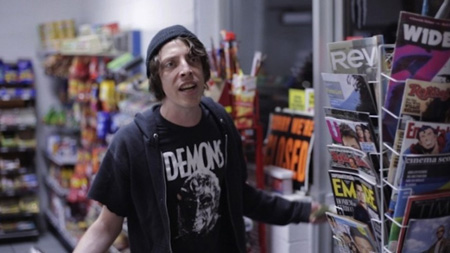 7. Buzzard (Joel Potrykus, 63 points)
7. Buzzard (Joel Potrykus, 63 points)
Lately I can’t help feeling disappointed in how culture seems to have curved to the drive for likeability. We don’t just like winners, we pathologically celebrate them. What about the weird, funky, vulnerable strains of heroism? One answer comes from Michigan filmmaker Joel Potrykus, who appears on this list for the second year in a row with Buzzard (last year it was Ape). It’s the first American independent film I’ve seen in awhile that felt prickly and alive. The hero Potrykus offers us is Marty Jackitansky (Joshua Burge), a slacker who subsists on scams, frozen pizza, video games, and heavy metal. He’s a hustler, and not a very good one, but he’s deeply committed to that life. What Marty exploits, and the film explores, is how the American Dream is really about ripping people off. When Marty takes it too far he runs away to Detroit, where his scams are met with increasing violence and consequences. An anarchic cousin to Rick Alverson’s The Comedy, these films would make for a great “hero we deserve” double feature. (Susanna Locascio)
************************************************************************************************************************************************************************
 6. Christmas, Again (Charles Poekel, 69 points)
6. Christmas, Again (Charles Poekel, 69 points)
Christmas, Again (available on VOD via Factory 25) is an engrossing, funny, and personal story of a guy who’s not only facing a rough time in a thankless, short-term job selling Christmas trees, he’s also having a rough patch in life. Facing a recent breakup and being forced out of his comfort zone by a cold, late night graveyard shift, Noel (pun likely intended) is portrayed with perfect misery by Kentucker Audley as a man who is externally trying to keep a straight face and get his work done while internally, he’s freaking out. But what I loved most about Christmas, Again is its subtle look at cycles and time frames running a course. Noel works winters selling trees but other jobs occupy other seasons and are fluid. His most recent relationship has ended; time for another one, maybe in the form of newfound friend Lydia (Hannah Gross). Even deeper, a Christmas Advent calendar plays a role not just in counting down days until this crappy job is over, but a more devious role that also represents a cycle. Hell, even the title indicates a situation that has occurred before and is playing out now. Yet somehow Poekel’s film remains an enjoyable slice-of-life journey that reaches a satisfying conclusion. (Don R. Lewis)
************************************************************************************************************************************************************************
 5. Stinking Heaven (Nathan Silver, 70 points)
5. Stinking Heaven (Nathan Silver, 70 points)
“I like making movies—just to be able to focus on the characters in my movies, rather than the disaster that is life.” Nathan Silver said this earlier this year about his fifth feature Stinking Heaven (available on VOD via Factory 25), yet it seems his characters too are offered no reprieve from the calamitous obscenities that make up everyday life. Set in New Jersey in 1990, the film is an ensemble piece wherein recovering addicts cohabitate in a residential home in the hopes of getting clean. Reenactments from scarring past events punctuate the encounters between the housemates, encounters that are fraught, laced with contempt, weighted down by possible past transgressions. The film was shot on an Ikegami, a news broadcast camera from the ’80s, and like Andrew Bujalski’s Computer Chess, the retro camera choice perfectly situates the world, a look that feels artificial yet wholly immediate, much like the fabricated nature of the relationships. This is a film of broken people coming together to heal, people who ultimately come to suffer the pained realization that the heaven they created does, indeed, stink. (Jesse Klein)
************************************************************************************************************************************************************************
 4. Entertainment (Rick Alverson, 79 points)
4. Entertainment (Rick Alverson, 79 points)
No one else is doing what Rick Alverson is doing, which is producing films that are deliberately designed to resist literal conventional interpretation. When we talk about the style of his films, we need to talk about the experience of watching them more than what they “mean.” Where does most entertainment need to position the audience in regards to the text or the performance? In Entertainment (available on VOD via Magnolia), this question swirls around the very visual widescreen experience of a lonely isolated stand-up comedian (Gregg Turkington) moving through a cold, callous, shattered American landscape. Because they are not led by a leash or told how to react on this increasingly hallucinatory journey, some viewers will feel ignored. Yet for those who release themselves from those inbred dramatic demands, derived obviously from other mediums such as literature and theater, and who are comfortable with being active in the viewing process, the experience of watching Entertainment will be both confounding and exhilarating. See it on the big screen while it’s still in theaters. (Mike S. Ryan)
************************************************************************************************************************************************************************
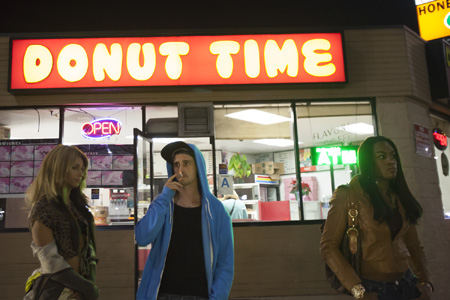 3. Tangerine (Sean Baker, 94 points)
3. Tangerine (Sean Baker, 94 points)
Nearly 20 years ago Harmony Korine said that he wanted “to make a film with images coming from all directions.” Though a certain homogeneity has crept into a bulk of independent films since that time, there are still many that blaze a trail, that challenge and reinvent the form, that make something new. Tangerine (available on VOD via Magnolia)is one of those films. The story of two transgendered sex-workers on a sun-soaked LA Christmas Eve, Sean Baker’s latest wildly vibrant feature challenges conventions of what stories can be told and how, finally transcending the question altogether. Baker shot the film on iPhones (with an app upgrade) and this choice perfectly complements the burnt pastel hues of Los Angeles, making them glisten, pop, overwhelm. The swooning camera moves, the frenetic editing pace, the bombastic yet nuanced performances all help to create a barrage on the senses, a film coming from all directions, and yet, at its core, its final truth could not be simpler: all we have is each other. (Jesse Klein)
************************************************************************************************************************************************************************
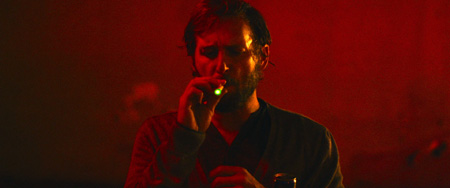 2. The Mend (John Magary, 137 points)
2. The Mend (John Magary, 137 points)
There’s a bit in John Magary’s debut feature when 40-ish drifter Mat (Josh Lucas) hears an ice cream truck’s musical refrain outside the window. Boyishly excited, he leaps up and runs into the street looking for the truck, but he never finds it, or at least we never see him find it. This tells us something about Mat, maybe. But what does it tell us about The Mend? The ice cream truck is a scripted detail that doesn’t “add up” to anything or lead anywhere, yet it comes across onscreen as an organic moment, a thing that happens, not a prefab plot point or meaning-generator, and in its small way it sums up what makes this film so distinctive. There are hundreds of such moments in The Mend (streaming now on Netflix), and the end result is a movie that feels crammed full of life and cross-hatched with dense and intricate textures. It beggars easy description: a raunchy realistic drama that coughs up pearls of heart-stopping lyricism; a comedy about heartbreak and family dysfunction and middle-aged malaise; an exquisitely crafted and controlled work that insists on messing up its room and soiling its pants. Seek it out, and let it surprise you. (Nelson Kim)
************************************************************************************************************************************************************************
 1. Heaven Knows What (Josh and Benny Safdie, 161 points)
1. Heaven Knows What (Josh and Benny Safdie, 161 points)
Dusty and Sweets McGee was an infamous 1971 film about heroin use in the hippie apocalypse of Hollywood told as a lyrical “day in the life” of beautiful real junkies. Despite its doc-like grit, it was released by Warner Brothers in order to compete with Jerry Shatzberg’s slicker NYC version starring Al Pacino, The Panic In Needle Park. Josh and Benny Safdie’s Heaven Knows What (available now via Radius/TWC) fits in perfectly with those two classic heroin addiction films, including shooting in the same Upper West Side neighborhood as Panic and using real junkies ala Dusty. Heaven Knows What is an amazing piece of cinema that in many ways achieves a truthful dramatic level that far surpasses those two earlier works. The film is made all the more tragic by the story of one of its main inspirations, Ilya Leontyev, who overdosed and died shortly after attending the unruly New York Film Festival premiere. What was he thinking as he watched his own character (played with endearing intensity by Caleb Landry Jones) succumb to the horrors of chronic addiction? The intersection of hardcore desperate junkie life mediated by real addicts living through self-authored delusions of future redemption and rendered “real” through the magic of cinema while being shot in actual stolen locations makes for a near surreal experience in which standard definitions of fact and fantasy, doc and fiction are thrown to the wind. An instant classic within the junkie genre, Heaven Knows What deserves to be seen by a far wider audience than it had during its limited release. (Mike S. Ryan)
************************************************************************************************************************************************************************
Other Films Receiving Votes (In Alphabetical Order)
7 Chinese Brothers (Bob Byington)
Amira & Sam (Sean Mullin)
Applesauce (Onur Tukel)
Bluebird (Lance Edmands)
Bob Birdnow’s Remarkable Tale of Human Survival and the Transcendence of Self (Eric Steele)
Cronies (Michael Larnell)
Digging For Fire (Joe Swanberg)
Doomsdays (Eddie Mullins)
Drunktown’s Finest (Sydney Freeland)
Felt (Jason Banker)
Fort Tilden (Sarah Violet-Bliss and Charles Rogers)
Funny Bunny (Alison Bagnall)
Gabriel (Lou Howe)
God Bless The Child (Rodrigo Ojeda-Beck and Robert Machoian)
Grandma (Paul Weitz)
The Grief of Others (Patrick Wang)
I Believe In Unicorns (Leah Meyerhoff)
I’ll See You In My Dreams (Brett Haley)
Man From Reno (Dave Boyle)
Manson Family Vacation (J. Davis)
The Midnight Swim (Sarah Adina Smith)
Nasty Baby (Sebastian Silva)
The Overnight (Patrick Brice)
People Places Things (Jim Strouse)
She’s Lost Control (Anja Marquardt)
Two Step (Alex R. Johnson)
Uncertain Terms (Nathan Silver)
Unexpected (Kris Swanberg)
Wild Canaries (Lawrence Michael Levine)
World Of Tomorrow (Don Hertzfeldt)
Young Bodies Heal Quickly (Andrew Betzer)
************************************************************************************************************************************************************************
Bonus: Short Films Deserve Honorable Mentions Too
Bad At Dancing (Joanna Arnow)
Dog Bowl (Gordy Hoffman)
Helberger In Paradise (T.J. Misny)
I Remember Nothing (Zia Anger)
Interesting Ball (Daniel Scheinert and Daniel Kwan)
Oh Lucy! (Atsuko Hirayanagi)
Review (Dustin Guy Defa)
Riot (Nathan Silver)
SMILF (Frankie Shaw)
Special Features (James N. Kienitz Wilkins)
Stop (Reinaldo Marcus Green)
We’ll Find Something (Casey Gooden)
World of Tomorrow (Don Hertzfeldt)
************************************************************************************************************************************************************************
(Contributing Voters/Writers: Zach Clark, Dustin Guy Defa, Brandon Harris, Holly Herrick, Nicholas Kemp, Nelson Kim, Jesse Klein, Don R. Lewis, Susanna Locascio, Mark Lukenbill, John Magary, Alex Ross Perry, Christopher Reed, Mike S. Ryan, Paul Sbrizzi, Michael Tully)









